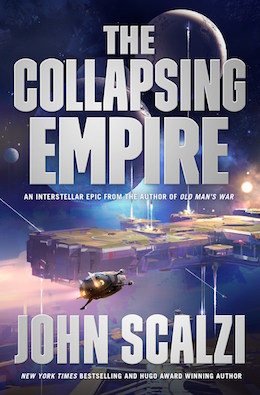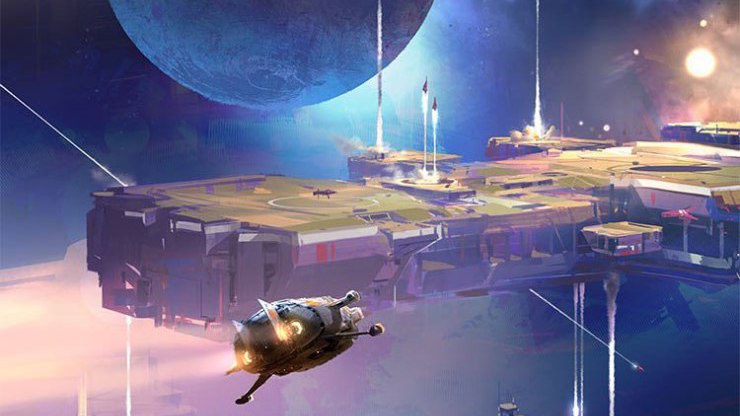At the end of March, my partner and I trekked four hours to Nashville, Tennessee to see John Scalzi not talk about The Collapsing Empire. That’s not abnormal; we already have the book, so he reads from awesome upcoming work that’s currently Secret (also Awesome). But during the Q&A, I was reminded of how entertaining Scalzi is as a performer (very) and how good he is at bringing that energy to his stories. The Collapsing Empire feels very much like a Scalzi novel, in that if you picked it up without reading the author’s name or the title, you’d know from the first few pages who it was written by if you’d read any of his previous work.
But it also feels distinct and different, too, because he levels up his ensemble character-work in a big way.
In The Collapsing Empire, humans live within The Interdependency, a millennium-spanning trade partnership between far-flung planetary systems. The members of The Interdependency are linked together by the Flow, a naturally occurring “river” of space-time that allows ships to pass in and out by using entrance “shoals” that remain stationary. It’s not faster-than-light travel, but it makes travel between systems notably faster. It also allows human colonization of different systems—through the sharing of resources via an elaborate system of trade—that would otherwise not be possible. And it’s all about to fall apart, because the Flow shoals are vanishing.
We’re taken on this journey via three main POV characters. The first is Cardenia, the brand-new emperox of The Interdependency, who has taken on the role after the death of her father. The emperox is the head of the trade guilds, the church, and the government, and Cardenia’s house, the House of Wu, founded the Interdependency thousands of years in the past. Cardenia doesn’t particularly want the job, but after the death of her brother, she doesn’t have much choice. Her new role leads to some troubling discoveries as she learns that the entire Interdependency is a sham for centralizing power and influence and that her father had been funding the study of the Flow and investigating its approaching end, as it naturally changes over time.
The second character is Marce Claremont, the son of the scientist that Cardenia’s father hired to study the Flow. As the story begins the planet that Marce is on, End, is suffering from escalating rebellion. End is plagued by rebellions because End is the only habitable planet in The Interdependency so it changes hands quite often; it’s also the farthest from the center of the Interdependency and the seat of government, trade, and faith, which makes a stable government hard to enforce. Marce’s father has the data that proves that the Flow will soon vanish for good, stranding everyone in whatever system they’re in at the time. This spells death for many—because of the way that The Interdependency functions, the only way systems survive is through the trade that the Flow allows. Except, that is, for End. Marce is given the task of carrying the data to the emperox.
The third character is Kiva Lagos, a foul-mouthed, politically and tactically brilliant member of the House of Lagos, who stumbles into the rebellion on End. When the government freezes Kiva’s rights of trade on End under false pretenses in order to use her guild’s money to fight the rebels, Kiva has to figure out how to recoup her costs amid political upheaval… especially when it becomes clear that rival House Nohamapetan (and a trio of siblings within it that Kiva really doesn’t like), is somehow involved in the rebellion on End.
Eventually, the three protagonists will fall into orbit around each other to face the crisis that’s bearing down on them with very little time to prepare: the end of the Flow, and therefore, The Interdependency.
The best part of The Collapsing Empire is these three characters and the supporting cast they interact with. Scalzi’s characters have always been great—funny, dynamic, and easy to identify with—but over the years he’s improved in the way he frames and builds each individual personality. Cardenia, Marce, and Kiva all come from drastically different origins, and their reactions to the future are specific to their own perspective. There’s plenty of humor in their interactions, but also an examination of power and power dynamics that never feels overbearing or preachy. The antagonists from House Nohamapetan—Ghreni, Amit, and Nadashe—never lose their humanity and become monstrous villains, but instead stay firmly rooted in a very human desire for power and influence, and are undone by their own greed and lack of foresight. It’s easy to both root for these characters to fail and also feel a bit of sympathy for their inevitable downfall at the hands of Nadashe Nohamapetan, the mastermind of the plan.
I’ve been handselling The Collapsing Empire in a very specific way: the characters who have the most power and influence and the ability to change things in the novel are, primarily, women. The main players are women, the central antagonist is a woman, and some of the best supporting characters are women. Men are certainly present, of course, and have important roles in the plot, but every time a new woman is introduced into the story she’s smart, capable, and awesome in her own unique way. The Interdependency is a lie built on strong-arming competitors, hoarding power, and boosting monopolies, but among its many ills is not a tired misogyny: in this world, women are powerful and competent, and it’s excellently done.
Other realistic touches abound. Much like our own reality, when encroaching change becomes obvious—be it to our climate, the dead-end future of fossil fuels, or the disregard for humanity inherent in unchecked capitalism—it’s rare that governments respond in a proactive way. Cardenia discovers this when she finds out that The Interdependency ignored the warnings of a previous emperox years earlier and lost an entire system when Flow shoals vanished. There were people who pushed back, but the machinery of profit and power, once in motion, is hard to stop. The Collapsing Empire can feel all too close to current political realities, but at the same time it’s still escapist literature, because it give us Cardenia, Marce, and Kiva—three people with authority, knowledge, and influence, with access to levers of power, who can potentially save the world. It’s the best type of wish fulfillment that comes paired with political and social commentary, but it doesn’t end in the way it would in our reality. How often do we wish scientists would go to our leaders and not only be listened to but have their evidence believed without question on the first trip? Cardenia and Kiva treat Marce in the way we wish all scientists with peer-reviewed data were treated: they trust that he knows his business. Government and trade officials, many of whom are women, believing and working with scientists! This is science fiction, all right.
 This novel is also space opera at its action-packed best. Older tropes involving empire, massive interconnected trade guilds, and space travel are freshened up with modern sensibilities and made relevant to our current realities, snappy dialogue is on point, and the narrative reads quickly and easily, allowing readers to glide through as it serves up complicated concepts in easy-to-digest pieces. The book operates on two levels: an entertaining interstellar political action thriller on one hand, and a commentary on power and human imperialism on the other. It’s massively readable, with characters that imagine a future that feels more genuine and authentic than many a science fictional generic, homogenous society—a future that made my democratic socialist heart soar.
This novel is also space opera at its action-packed best. Older tropes involving empire, massive interconnected trade guilds, and space travel are freshened up with modern sensibilities and made relevant to our current realities, snappy dialogue is on point, and the narrative reads quickly and easily, allowing readers to glide through as it serves up complicated concepts in easy-to-digest pieces. The book operates on two levels: an entertaining interstellar political action thriller on one hand, and a commentary on power and human imperialism on the other. It’s massively readable, with characters that imagine a future that feels more genuine and authentic than many a science fictional generic, homogenous society—a future that made my democratic socialist heart soar.
The Collapsing Empire is the first book in a brand-new series that ends on a bit of a cliffhanger with the future uncertain, but there will be at least one more book that continues the story of how The Interdependency adapts (or not) to the oncoming end of the Flow. Plus, Tor decided to give me all the birthday presents they missed before they realized I existed, so this is the first book in the epic 13 book deal that Scalzi will be writing over the next decade. If the brilliant, punchy fun of this book is any indication, we’re about to witness a brilliant period in Scalzi’s career. Don’t miss out on The Collapsing Empire and a rocking new series.
The Collapsing Empire is available from Tor Books.
Read the opening chapters of the novel, beginning here with the Prologue.
Renay Williams stumbled into online fandom, fanfiction, and media criticism via Sailor Moon in 1994. Since then, she’s become an editor at Lady Business and a co-host of Fangirl Happy Hour. She can be found having emotions over the lives of fictional characters on Twitter @renay.










